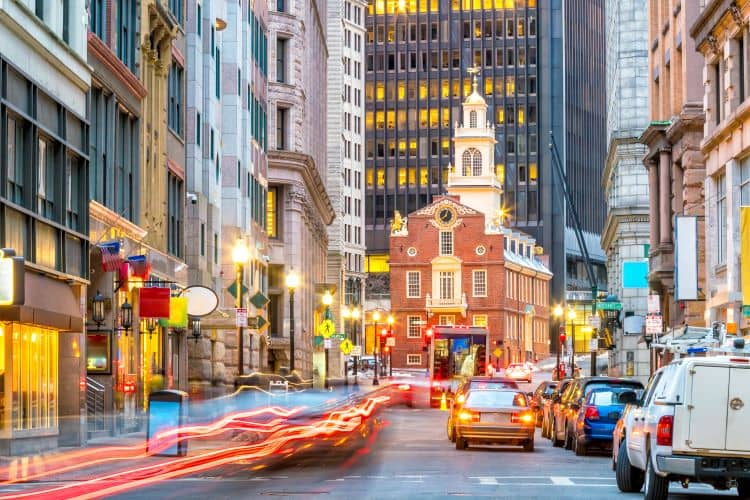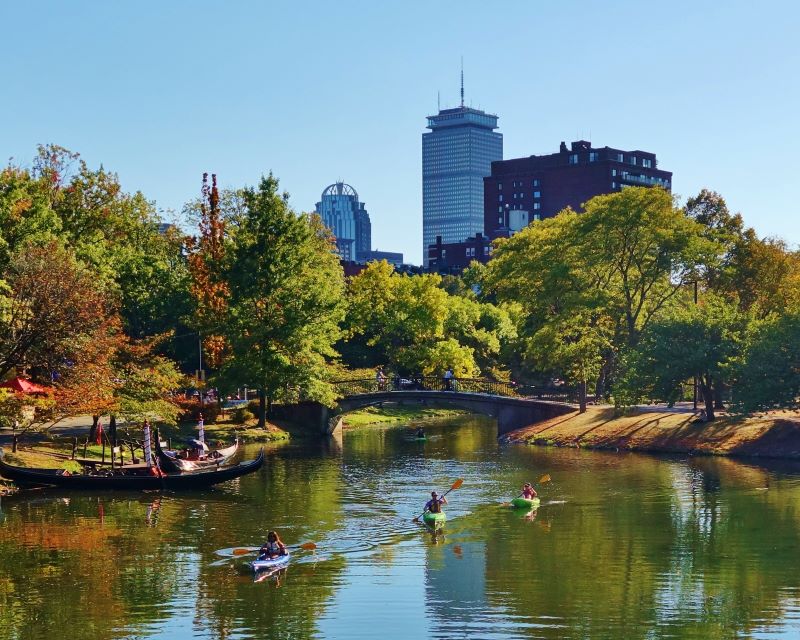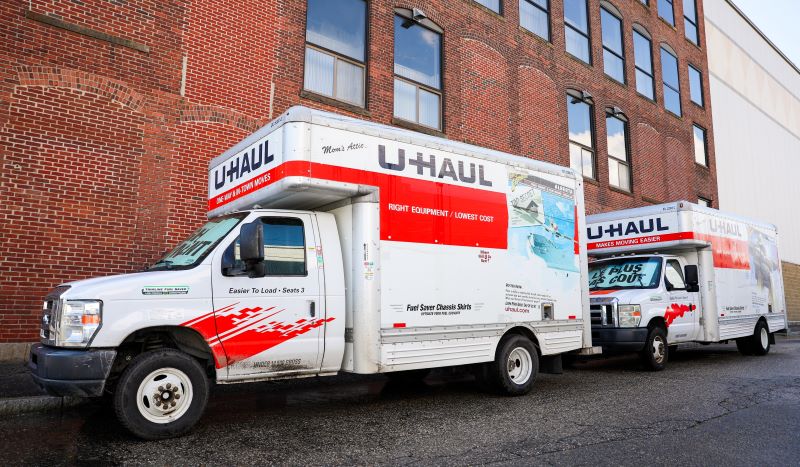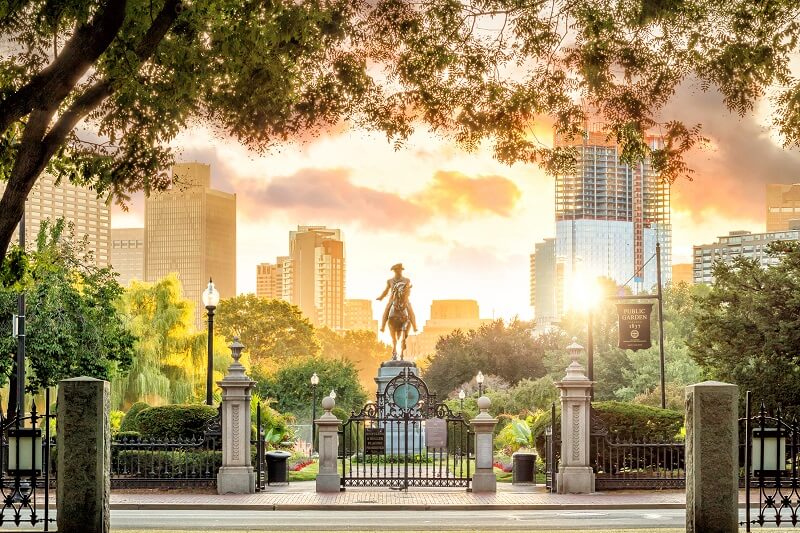
Are you thinking about moving to Boston? If so, you’re certainly not alone. Boston is an amazing city. That’s why millions of people from across the world consider moving to Boston on a yearly basis. Many visitors remark that Boston reminds them of Europe. Perhaps this is due to the fact that the city features historical landmarks wherever you turn. Maybe it’s due to the beautiful architecture that features stunning Victorian buildings and charming brownstones. It could also be based on the cramped and winding cobblestone streets. However, there’s certainly more to Boston than the history and old-world charm.
Boston is also referred to as The Hub; although some people used to refer to Boston as Beantown which is now considered to be out of style. Boston is the biggest and fastest-growing city in New England. This is based on population, job growth, sports teams, universities, hospitals, and of course historical significance. Many consider Boston a sports powerhouse. This is based on the recent success of the Bruins, Celtics, Red Sox and Patriots. Other people consider Boston to be a city of intellectuals. This is because Harvard, MIT, Northeastern, Boston College, Boston University and many others are located in Boston. Although there is technically a city of Boston, some of us refer to the entire Metro Boston Region as Boston.
This extends from Weymouth, which is south of Boston, to Saugus which is located north of the city. Boston is a great place to live, work, study, and raise a family. There is a vast array of arts, culture, and shopping destinations. There’s also a wide variety of restaurants, outdoor activities, and historical sites to see. We have put together some valuable information for people who are thinking about moving to Boston. It will help you get familiar with the different areas of the city ahead of time. In addition, you will learn a few things that will help you fit right in as an official Bostonian. When you move to Boston you certainly don’t want to look like a tourist. So, sit back, relax, and enjoy the article.
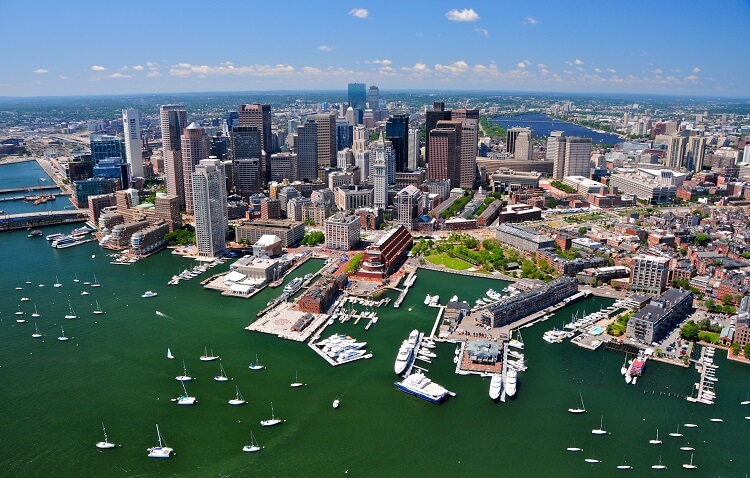
Choose A Neighborhood Before You Start Looking At Apartments
Boston has been experiencing an influx of people over the past decade due to an expanding job market and increasing enrollment at local universities. As a result, the metro area is experiencing a historic shortage in both Boston apartments and Boston real estate for sale. Due to rising demand and limited supply, the cost of housing has increased significantly over the past decade.
You need to be aware of that before moving to Boston. Despite the high cost of living, moving to Boston is still a great option if you can afford it. There are numerous neighborhoods that are attractive places to live. You should always choose an area of Boston that is based around your income. Keep in mind that some apartments and houses are more affordable than others. This holds true even for apartments that are of similar size. For example, apartment A may have an updated kitchen and brand-new hardwood floors. On the other hand, apartment B hasn’t been updated in years. The difference may very well reflect in the price of the monthly rent.
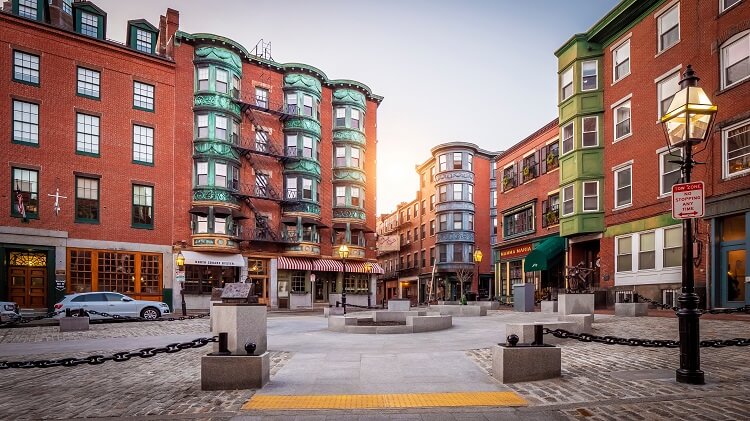
The bottom line is that you should find an apartment or home in an area that is central to your interests, lifestyle, and budget. Keep in mind that a long commute to work or school tends to be incredibly time consuming. Always factor in the distance to and from your place of work or school when searching for a place to live in Boston.
Neighborhood Amenities to Look for When Moving to Boston
Picking which neighborhood to apartment or house hunt in can be both exciting and stressful. With so many great Boston neighborhoods, the options can feel overwhelming. We compiled a list of neighborhood amenities to consider which will be helpful for picking the best neighborhood in Boston for you.
Outdoor Space:
While some people are more into the outdoors than others, neighborhoods with green spaces can be much more comfortable for anyone to live in. Oftentimes parks are more than just a place to hold picnics—many have local events such as farmers markets or neighborhood parties. Not only are these events fun on your own, but they are also a great way to get to know your neighbors! In many Urban areas of Greater Boston, lots of people prefer parks to a backyard because there is less maintenance and larger spaces to enjoy outdoor activities. It’s also a lot easier to meet people and get involved in a pick up game of flag football or basketball. Outdoor space is definitely one of the more sought after neighborhood amenities.
The Commute:
If you are researching neighborhoods, chances are one of the first things you look into is how long the commute will be. Instead of just looking at time, it is important to look into the ease of the commute as well. For example, a bus stop could be right down the street from you, but if that bus is never on time it is not going to be a good amenity. Whether you are traveling to work, school, or anywhere in between it is important to research how comfortable and reliable your commute will be! There are also great new apps out there to check out that can predict when your Public transportation is coming so you can finish up your coffee at the right time and walk out the door without wasting a minute.
Food and Retail:
We’ve all been there—you get home after a long day only to realize you forgot to pick up the milk you need for dinner and toilet paper to restock the bathroom. In situations like this, there is no overestimating the convenience of having retail shops and grocery stores/restaurants nearby. It’s always nice to have a good mix of places to buy groceries and places to get take out. If you don’t have shops nearby, start thinking about buying in bulk so make sure the pad you pick has either a generous pantry or a good basement to store larger bulky supplies such as paper towels.
Personal Deal Breakers:
The reason different neighborhoods have their own unique culture and features is because everyone has different tastes, education, and work responsibilities. People move to specific areas for reasons such as nightlife, schools, art galleries, shopping and more. Of course, there are also deal breakers that could keep you away from a certain neighborhood.
For example, if you are a light sleeper and bothered by loud noises, it is probably best to avoid anywhere close to Logan airport if the house hasn’t been properly outfitted with noise canceling windows and other sound dampeners. It makes sense to watch and know the flight path of airplanes. If you are into history and old homes, you probably do not want to move to an area with a lot of construction and new developments. Make a list of your personal deal breakers, and rank them from most to least important. This will be incredibly helpful in helping you make the final choice of where to move!
Whatever neighborhood amenities you are looking for, Boston Pads has local specialists who can help you find the best place for you to call home! The following information will outline a few of the popular neighborhoods in the city of Boston and just outside the city. When it comes to Boston and surrounding areas there is a neighborhood for everyone. Some local knowledge will provide you with a better view as to where you want to call home.
Popular Neighborhoods to Live in Within City Limits
South Boston
First and foremost, South Boston is locally known as “Southie.” If you conduct your search there you should get to know the local lingo. Southie is currently home to many young professionals who are a few years out of college. In addition, many families call South Boston home. This is due to the fact that Southie provides a great deal of apartment options.
This area also provides easy access to downtown and other areas of the city through public transportation. In addition, Boston’s Seaport and waterfront is only a few blocks away. There are plenty of bars and restaurants to choose from.
South End
Boston’s South End neighborhood may be small, but it’s one of the most picturesque areas in the entire city. There are a great deal of brownstone homes that command a premium. In fact, any apartment in this area is expensive, but it can be well worth it. The South End neighborhood is near downtown Boston. There are many high-end restaurants and shopping venues to explore.
North End
Did you know that the North End neighborhood of Boston is one of the most historic in the city? If you enjoy Italian cuisine this is the place for you. Since the North End is so well known, the rent tends to be on the higher side. You may also find that you will get a lot less square footage for the money. There are many lines of public transportation to choose from. The North End is also close to the Boston Garden where you can catch a Boston Celtics game or Boston Bruins game. If you don’t like busy areas, the North End is not for you. In the summer, the area is packed full of tourists who are there to take in Boston’s rich history and celebrate the Summer Festivals.
Back Bay
Most people who plan to move to Boston have at least heard of the Back Bay. It happens to be one of Boston’s most popular areas. This famous Boston neighborhood is well known for its gorgeous brownstones. So, if you plan to move to the Back Bay expect to pay top end for your rent. The Back Bay is centrally located near Newbury Street, Fenway Park, and Storrow Drive.
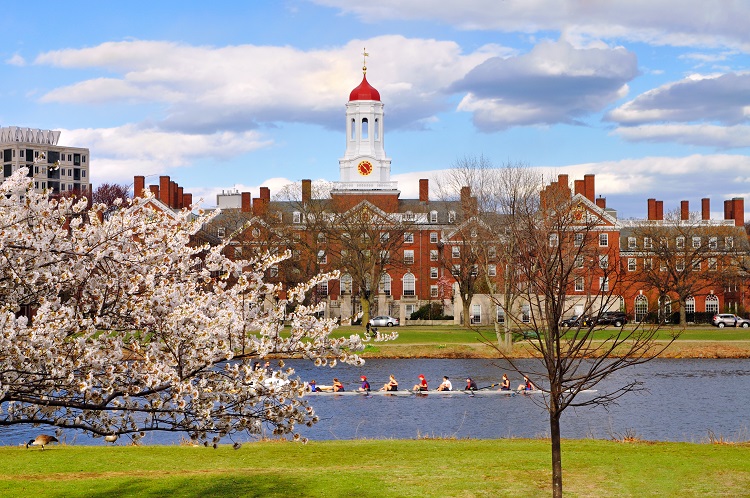
Popular Neighborhoods to Live in Outside of City Limits
Cambridge
The city of Cambridge, MA is located close to Downtown Boston just across the Charles River. It’s home to Harvard University and the Massachusetts Institute of Technology, otherwise known as MIT, Leslie University, and more! It goes without saying that Cambridge has a college town feel to it. It is also the technology hub of New England. This holds especially true in the Kendall Square area. That means there are plenty of companies to work for that are based out of Cambridge. Harvard Square, Kendall Square, and Inman Square provide a plethora of food and entertainment choices.
Somerville
If you are thinking about or planning to move to Boston, Somerville is certainly an area to consider. In fact, it’s one of the most increasingly popular neighborhoods located outside of Boston. Somerville provides an option to be outside of the hustle and bustle of Boston, while still being nearby. The monthly rents tend to be more affordable when compared to other areas located in Boston and surrounding areas. There is plenty to do in Somerville. Davis Square, Union Square, and Assembly Row provides residents with a great deal of restaurant and bar options.
Arlington
Arlington, MA is an incredible option if you prefer to live in a small town that’s located close to Boston. In fact, it’s only a short train ride or drive from Downtown Boston. Arlington has some cool bars and a growing restaurant scene. Monthly rents are priced a bit lower when compared to some of the other neighborhoods in Boston and surrounding areas.
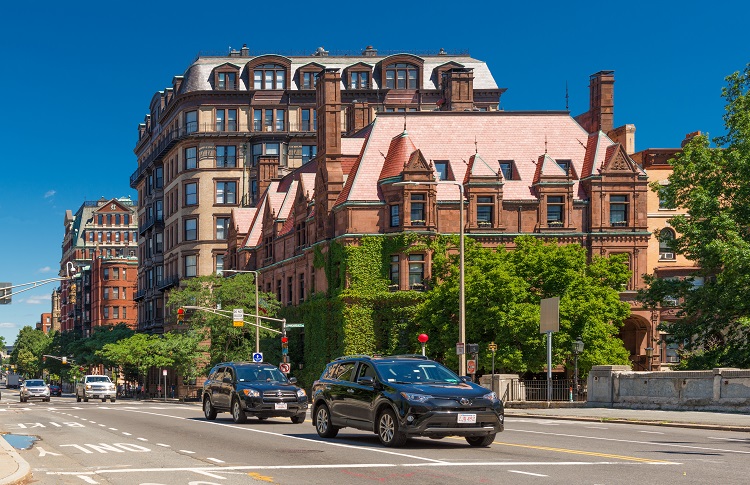
Things to Keep In Mind When Moving To Boston
Driving In Boston Can Be Difficult
The stories that you may have heard about driving in Boston are true. The streets within the city can be incredibly difficult to navigate. Boston drivers are well known to be aggressive. If you’re new to Boston, you may need an adjustment period until you get used to driving here. Factor that in if you plan to drive to work or school. A great deal of Boston residents prefer to take public transportation instead of driving in the city.
…Parking In Boston Can Be Even More Difficult
If you have ever driven an automobile in Boston and found that to be tough, try parking it. In fact, parking spaces are few and far between unless you buy or lease a parking space. Many people end up driving around until they can find a spot to park, but that can take a long time if you live in a congested area. That’s why some of us end up parking in one of those expensive garages. By the way, if you’re interested in buying or leasing parking spaces in Boston, we can help.
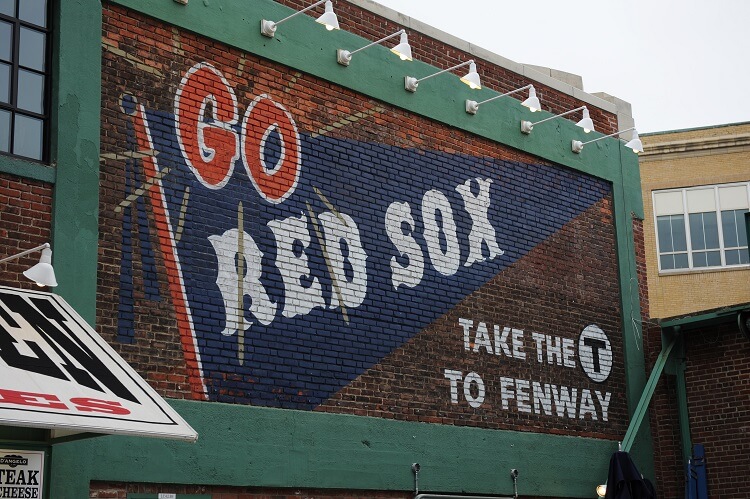
Bostonians Are Proud Of Their City, History, and Sports Teams
Most Bostonians take great pride in their city. They are incredibly proud of the role that Boston played during the American Revolution. Bostonians are particularly sensitive about their sports teams. Just try wearing a New York Yankees hat and you’ll see what we mean. By the way, if you do wear a NY Yankees hat around town, expect a few harsh words from the locals. Another easy way to ruffle the feathers of a Bostonian is to compare the city of Boston in any unfavorable manner to other cities. Always keep in mind that Bostonians actually believe they have better pizza than Chicago, New York or New Haven, CT. They also believe they have better Chinese food than San Francisco.
Boston Is A Great Place To Live For History Buffs
Are you interested in the Revolutionary War? If you answered yes to this question then you’ll absolutely love living in Boston. In essence, it’s the city where the Revolutionary War was planned and initiated. You can follow the Freedom Trail to many historic sites that highlight Boston’s role in the war for Independence. In addition, you can learn all about Boston’s historic rise at the USS Constitution Museum. There are also many historic houses in the city. You can also tour the famous graveyards where some of our founding fathers are buried. You can also learn all about Boston history at the Boston African American National Historic site. The John F. Kennedy Presidential Library is located in Boston as well.
Boston Has A Strong Tech Scene
The tech scene in Boston is currently booming. Boston has been among the top 4 metros attracting VC funding over the past decade. That means there are a great deal of business opportunities in Boston and surrounding areas. If you’re searching for a tech related job or are planning to start a technology company, you should add Boston to your list of cities. The tech scene has grown in Boston by leaps in bounds in recent years. This is in part thanks to the abundance of top-notch colleges located in the city. In essence, many tech students from around the world decide to stay in Boston after they graduate.
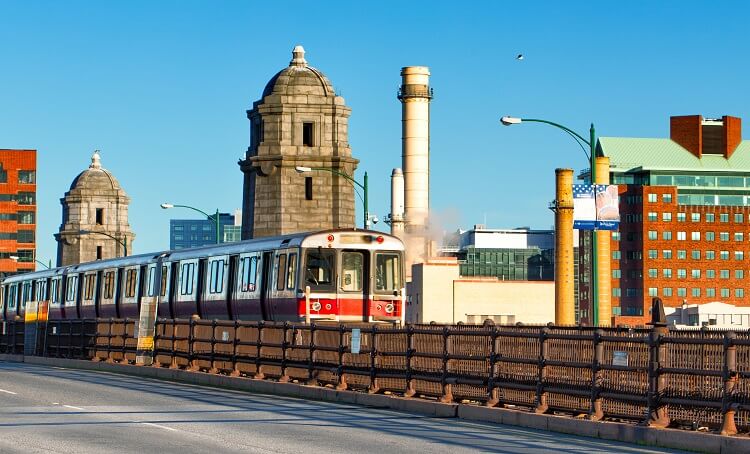
Public Transportation Tends To Close Before The Bars
Public transportation in Boston, known as the T, tends to close before the bars. You should be aware if you plan to stay out late during the weekends or during the weeknights. For example, most bars in Boston close at 2 PM. However, depending on the line, the T stops running between 12:30 am and 1 PM. So, if you plan to close the bars down, just make sure you bring enough money for an Uber or a cab. This can be a big adjustment if you’re moving from a city that has transit available 24 hours per day 7 days per week.
It’s Easy To Go Green In Boston
Most people who don’t live in Boston are unaware of the fact that it is a great place to go green. First and foremost, you don’t need a car to live in Boston due to the many public transportation options to get around the city. You can also purchase fresh, locally sourced food at one of the many farmers markets located throughout the city. Thanks to state government backed incentives, you may even be able to rent an apartment that runs off of solar energy.
Boston Is Full Of The Arts
Boston is not only a city that is steeped in history, traditions, and sports. It is also home to some incredible art. In fact, there are plenty of culturally based venues that keep the art lovers quite happy. For example, there is the world-renowned Museum of Fine Arts. This incredible place permanently houses some of the most valuable pieces of artwork in the world. There are also various special exhibits throughout the year. You can also see many other famous pieces of art at the Isabella Stewart Gardner Museum and the Harvard Art Museums. Boston is also home to the world-famous Boston Pops and Boston Symphony Orchestra.
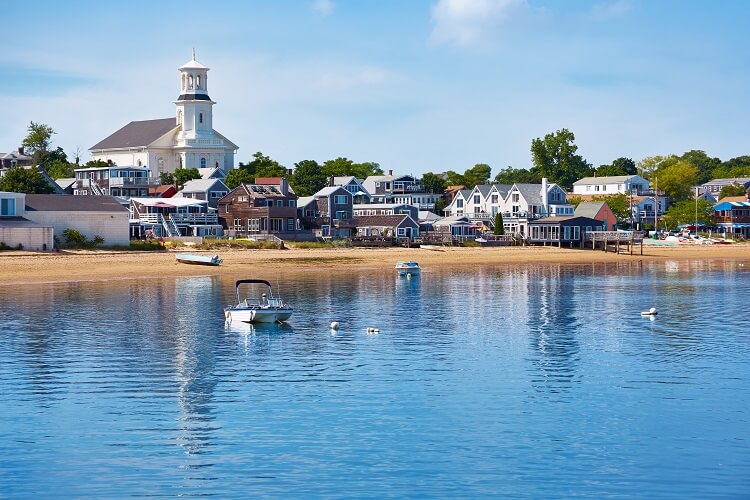
Boston Is Close To Other Famous Areas In New England
If you are unfamiliar with Massachusetts, you may not be aware that there are other areas besides Boston to explore. For example, Plymouth, MA is just about a 30-minute drive from Boston. You can visit the famous Plymouth Rock where the Pilgrims first landed. You can also board an exact replica of the Mayflower in order to see how the Pilgrims traveled to America. If you really want to see how the Pilgrims lived when they reached our shores, take a tour of Plymouth Plantation.
If you travel another 30 minutes south, you will reach the world-famous Cape Cod. There are many beaches and quaint villages to explore in the Cape. You can even take a ferry to Martha’s Vineyard from Cape Cod. New Hampshire, Vermont, and Maine are all located north of Boston. There is plenty to do there from beaches, camping, and skiing in the winter. If you feel like stretching your wings take a ride to the Berkshire Mountains, which are located West of Boston.
The Ultimate Checklist For Relocating To Boston
If you’re relocating to Boston, it’s important to be prepared for your big move well in advance. The city of Boston has something for everyone. It’s an incredibly exciting place to live with interesting neighborhoods, tons of culture, and plenty of American history. Let’s not forget passionate sports fans that root for both college and professional teams. There are also many restaurants, clubs, and bars to choose from.
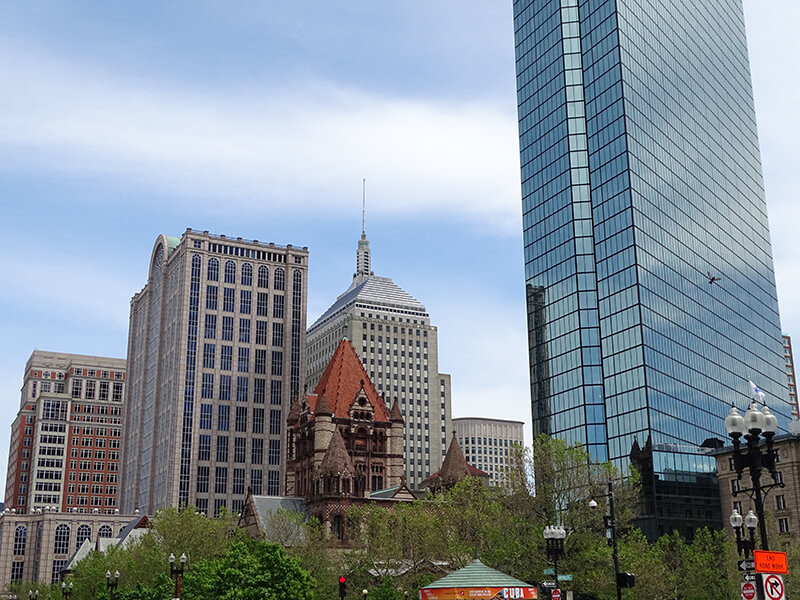 Keep in mind that moving to a new city is a time-consuming venture. Finding a new place to live, packing your stuff, and ultimately relocating to Boston requires both planning and patience. However, it’s well worth it.
Keep in mind that moving to a new city is a time-consuming venture. Finding a new place to live, packing your stuff, and ultimately relocating to Boston requires both planning and patience. However, it’s well worth it.
Even if there is a lot to do before the big move, you don’t need to be overwhelmed. Moving can be made so much more manageable if you take it one step at a time. You will also significantly reduce your stress levels if you set a definitive timeline.
Our ultimate checklist for relocating to Boston will help you move in the smoothest and most efficient way possible.
1: Visit Boston
Prior to relocating to Boston, you should visit here at least once or twice. Make sure to pack a guidebook to the Hub. You can also go to city hall for various maps, recommendations, and brochures. If you want to explore the neighborhoods before committing to a specific one, set up a phone call with a real estate agent. They will help you get the lay of the land regarding the various neighborhoods in Boston. Depending on where you’re going to work, how you’ll be commuting there, your price range, and other needs they’ll be able to suggest a few neighborhoods.
During your visit, make sure to check out different parts of town. You may have been initially attracted to one neighborhood, but upon visiting you might fall in love with another. You should also ask your real estate agent to show you places that meet your criteria during your visit.
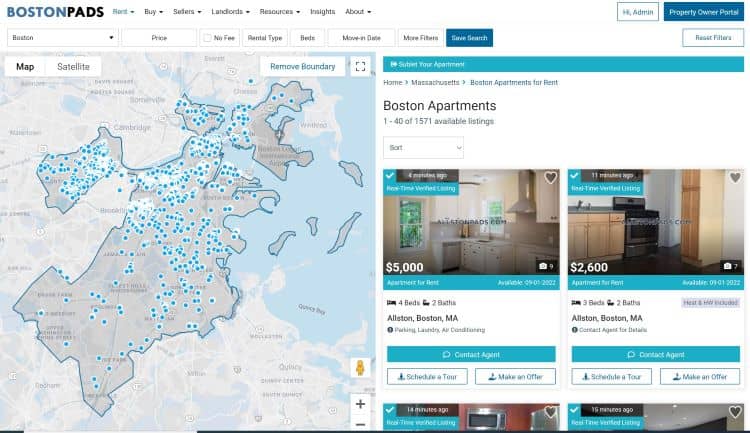
2: Find A Place To Live Before Relocating To Boston
Moving is stressful enough. Imagine moving to a new city if you don’t have a place to live yet? That’s why it’s so essential to find an apartment or house to move into before relocating to Boston. We already mentioned how important it is to work with a real estate agent. Yet, it’s worth mentioning again. Your agent will perform a significant amount of the tasks that you either can’t do or don’t want to take on. They are your eyes and ears in Boston.
A licensed real estate professional will ensure that you’re getting into the best situation based on your set of circumstances. The Boston Pads Real Estate Portal suggests many talented rental agents and buyer representatives. If you can’t make a trip to the city before moving here, they will set up showings through video conferencing. Your rental agent or buyer’s representative can do all of the footwork for you. He or she can also take care of the paperwork, and even negotiate on your behalf.
3: Budget For The Moving Expenses
If you’re moving out of state when relocating to Boston it certainly won’t be cheap. If you hire a professional moving company, it could cost up upwards of $2,000 to $3,000 or more. That’s why you need to factor this into your overall budget so that it won’t come as sticker shock. We suggest that you contact a few movers first to see how much money it will cost.
Moving day will be a heck of a lot easier if you hire a company to do everything for you. However, if the figure is too high you can always go the do-it-yourself route. You’ll probably need to rent a moving truck and pay for moving supplies and other necessary expenses. If you’re being relocated for work, check with your employee to see if they will cover the moving expenses.
4: Choose Your Moving Date
You have found an apartment to rent or house to purchase and signed on the dotted line. The place is yours now. The next step is to choose your moving date so that you can actually relocate to Boston. When scheduling the move, you need to consider some factors. For example, if you’re using a moving company, their calendar will come into play. You also need to consider your work schedule, any family related concerns, and the weather. In addition, the day that you move on will also affect how much it will cost.
There is a higher demand to move on weekends, holidays, and during the summer months. That means there are fewer movers available and the costs are typically higher. The winter is a good time to move price and availability wise, but you do need to be cautious of snowstorms. You can also save a bit of money by moving on a weekday.
If you’re renting an apartment, be aware that the majority of Boston apartment leases begin on September 1 due to the large student population. You’ll have a much larger inventory to choose from if you can work your move in date around September. It’s also important to mention that many of these September rentals become available months before the apartments are vacated. In the chart below, you can see that Boston’s real-time availability rate (RTAR) peaks in the spring months while the real-time vacancy rate (RTVR) spikes in September as old leases expire.
This means you’ll have the best luck looking in March and April for an apartment with a September move-in date. This will give you plenty of time to prepare for the move.
5: Purchase Your Moving Supplies
Relocating to Boston means you’re going to need to pack up your current apartment or house. You’re going to need the right supplies including moving boxes, bubble rolls, bags of foam popcorn, and lots of packing tape. You should purchase these items about a month in advance of your move so that you can start the packaging process.
6: Formulate A Packing Plan
Remember that old saying “prior planning prevents poor performance?” It certainly applies to packing about your old home in preparation for relocating to Boston. You should come up with a realistic timeline and make a solid plan before you start shoving things in boxes. It’s always a good idea to pack non-essential items first. That way you won’t need those things before your move. Home decor items, books, artwork, and certain electronics are all examples of non-essential items.
Pack your essential items last. You’re going to need these things leading up to your move. For example, kitchen utensils, dinnerware, and toilet paper are all essential items. Pack all records and important documents separately, and make sure the boxes are easy to identify. When packing, you’re sure to come across items that you don’t want or simply can’t take with you. You can either sell these things before you move or donate them to charity.
7: Transfer Or Cancel All Local Memberships
Sometimes the little things that add up end up slipping through the cracks when you relocate to Boston. For example, a lot of people forget to cancel their gym memberships. They end up paying the fee every month for months on end until it finally dawns upon them. The same holds true for local community-based clubs. Most organizations require a 30-day in advance cancellation notice. So, it’s a good idea to cancel your memberships at the same time that you start formulating your packing plan. If your gym has a location in Boston, make sure to transfer it before you move.
8: Inform Others That You’re Relocating To Boston
Although it may sound obvious, many people forget to inform their family, friends, and neighbors that they’re relocating to Boston. You probably won’t have time to have an in person or even phone conversation with everyone. However, you can absolutely find the time to send out a group email with your new address and other details or post it on social media as is popular these days.
9: Set Up Your Utilities
Before relocating to Boston, it’s important to set up your utilities with the local companies. That way, you’ll have electricity, cable television, and Internet available when you arrive at your new home. It’s also important to cancel your utilities at your old home. Some utility companies will allow you to transfer from your old address to your new one in order to make things easier.
10: Forward The Mail To Your New Address
Forwarding your mail is simple. It can also be done well in advance of relocating to Boston. Simply get on the United States Post Office website and pick the date that you want to start forwarding your mail. It’s as easy as that.
11: Pack A Suitcase with Clothes And Essentials
If you’re relocating to Boston from out of state, you should pack a suitcase. That way, you’ll have a few days’ worth of clothes and other essential items handy at all times. It can take the moving company a few days or even a week to arrive in Boston with your belongings. Even if it only takes a day, most of your things will be in boxes. That makes is hard to find what you need until everything is unpacked.
12: Enjoy Your New Adventure In Boston
At this point you’ve completed the process of relocating to Boston. The next step is to finish unpacking and settle into your new home. Once you accomplish that it’s time to explore the city and everything that Boston has to offer.
The Boston Pads Real Estate Portal is the number one source for buyers, sellers, renters, landlords, and investors. You will find all of the data, tools, and tips that you need to make important real estate related decisions.
Moving to Boston Could Be Your Best Idea yet
In conclusion, everyone should move to a new city at least once in his or her life. Boston is a great place for that especially if you have knowledge about the various aspects of the city. That is why it’s important for you to get to know the city a bit before moving to Boston. In fact, you should get to know the city before traveling here so that you will know what to expect. You need to know about the various neighborhoods in which to live. It’s also important to have a grasp on the things that you can do in this wonderful city. Last but certainly not least, it’s important to know the way that Bostonians think about their city.
If you can get familiar with these things before moving to Boston, your experience here will be that much better. Boston Pads is here to help your move to Boston each and every step of the way. We can help you find the best selection of Boston apartments. You can also search through listings of Boston condos and Boston homes for sale available in MLS. If you’re relocating to Boston or simply need help moving Boston Pads will assist you with our vast array of relocation services. Our main goal is to make your move to Boston or surrounding areas a pleasant one. In fact, we strive to make your move as easy, smooth, and stress free as possible. We look forward to working with you.

Demetrios Salpoglou
Published March 8, 2023
Demetrios has pulled together the largest apartment leasing team in the Greater Boston Area and is responsible for procuring more apartment rentals than anyone in New England – with over 130k people finding their housing through his services. Demetrios is an avid real estate developer, peak performance trainer, educator, guest lecturer and motivational speaker.






